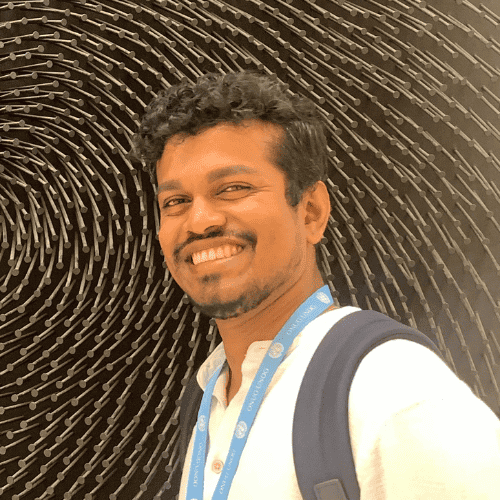
Ravi Tissera participated in DTP’s program on Human Rights and Development and Indigenous Peoples in Myanmar in 2015 when he was a student activist member of Pax Romana Sri Lanka. Today he is the International President of the International Movement of Catholic Students (IMCS/MIEC) Pax Romana.
“Reflecting back now, I can confidently say that participating in the DTP training program in 2015 saved me 20 years of learning about how effectively one could use advocacy and campaign toolkits. The DTP presents key information and advocacy toolkits in their training program so eloquently that I feel lucky to have participated.”
Born in Sri Lanka, a predominantly Buddhist country, Ravi felt the subtle otherness from his childhood as a minority Christian. It was his school teacher mother’s unwavering commitment to her students and dedication to justice and service that had a profound impact on Ravi, shaping his values and motivations in life.
Ravi’s Catholic faith played an important role in influencing Ravi and his commitment to service and justice, but identifying as Queer, Ravi found that the Church was not always comfortable with his sexual identity.
For Ravi, his faith and these combined experiences— the faith-based ‘otherness,’ and the values of justice instilled by his mother, contributed to his worldview and inspired his commitment to make lasting change in the world.
Ravi enrolled for a law degree at the university in Colombo, where he came into contact with IMCS Pax Romana. The strong foundation of his Catholic faith, combined with a keen sense of justice and a first-hand understanding of societal hierarchies, provided Ravi with the necessary tools and passion to work towards a more just and equitable world.
Since then Ravi has taken on critical national, regional and global leadership roles, supporting and nurturing young people to be involved in making change, and offering solidarity. He has greatly valued the role of DTP in this time.
“DTP’s programs underscore the value of investing in training programs to facilitate the next generation of human rights advocates in Asia, a region where democracy and human rights are under attack in many places.”
Ravi believes that
“DTP is unique in its approach and has no agenda apart from empowering grassroots activists. DTP brings grassroots activists who have no voice or less voice compared to more prominent activists. Without DTP training, most of these budding activists otherwise would not have had learning opportunities.”
Ravi’s belief in building the capacity of young people is reflected in the establishment by Pax Romana of training centres for young advocates and human rights defenders in France and in Chiang Mai. The new regional training centre in Chiang Mai has been put at the service of human rights and justice movements in Asia and the Pacific.
Finally, Ravi believes networking is a unique aspect of DTP training. Apart from IMCS, he is now part of a global DTP network.
“I now know that if I am attacked or thrown into jail for my rights-based advocacy work, my DTP community will stand up to defend me. That is an empowering feeling.”
DTP acknowledges the traditional custodians of the land on which we work, the Bedegal people of the Eora Nation. We recognise their lands were never ceded, and we acknowledge their struggles for recognition and rights and pay our respects to the Elders – past, present – and the youth who are working towards a brighter tomorrow. This continent always was and always will be Aboriginal land.
Aboriginal and Torres Strait Islander peoples should be aware that this website contains images or names of people who have passed away.
DTP acknowledges the traditional custodians of the land on which we work, the Bedegal people of the Eora Nation. We recognise their lands were never ceded, and we acknowledge their struggles for recognition and rights and pay our respects to the Elders – past, present – and the youth who are working towards a brighter tomorrow. This continent always was and always will be Aboriginal land.
Aboriginal and Torres Strait Islander peoples should be aware that this website contains images or names of people who have passed away.
Privacy Policy | Terms of Use | Disclaimer | Policies
© 2022 Diplomacy Training Program | ABN 31 003 925 148 | Web Design by Studio Clvr